- Home
- Cecelia Ahern
A Place Called Here Page 2
A Place Called Here Read online
Page 2
No matter how much action and noise had been created in the kitchen to avoid the uncomfortable silence, it didn’t seem to work. The silence drowned it all out.
My answer: “Because I can’t find it, Mum.”
“What pair are they?”
The easy smile, the pretense that this was a casual conversation and not a desperate attempt at interrogation to find out how my mind worked.
“My blue ones with the white stripes,” I answered on one particular occasion. I insisted on bright-colored socks, bright and identifiable so that they could be easily found.
“Well, maybe you didn’t put both of them in the linen basket, honey. Maybe the one you’re looking for is somewhere in your room.” A smile, trying not to fidget, swallowing hard.
I shook my head. “I put them both in the basket, I saw you put them both in the machine and only one came back out. It’s not in the machine and it’s not in the basket.”
The plan to have the washing machine switched on as a distraction backfired and was then the focus of attention. My mum tried not to lose that placid smile as she glanced at the overturned basket on the kitchen floor, all her folded clothes scattered and rolled in messy piles. For one second she let the façade drop. I could have missed it with a blink but I didn’t. I saw the look on her face when she glanced down. It was fear. Not for the missing sock, but for me. She quickly plastered on the smile again, shrugging like it was all no big deal.
“Perhaps it blew away in the wind, I had the patio door open.”
I shook my head.
“Or it could have fallen out of the basket when I carried it over from there to there.”
I shook my head again.
She swallowed and her smile tightened. “Maybe it’s caught up in the sheets. Those sheets are so big; you’d never see a little sock hidden in there.”
“I already checked.”
She took a cookie from the center of the table and bit down hard, anything to take the smile off her aching face. She chewed for a while, pretending not to be thinking, pretending to listen to the radio and humming a song she didn’t even know. All to fool me into thinking there was nothing to be worried about.
“Honey,” she said, smiling, “sometimes things just get lost.”
“Where do they go when they’re lost?”
“They don’t go anywhere.” She smiled. “They are always in the place we dropped them or left them behind. We’re just not looking in the right area when we can’t find them.”
“But I’ve looked in all the places, Mum. I always do.”
I had; I always did. I turned everything upside down; there was no place in the small house that ever went untouched.
“A sock can’t just get up and walk away without a foot in it.” Mum false-laughed.
You see, the way Mum gave up right there, that’s the point when most people stop wondering, when most people stop caring. You can’t find something, you know it’s somewhere, and, even though you’ve looked everywhere, there’s still no sign. So you put it down to your own madness, blame yourself for losing it, and eventually you forget about it. I couldn’t do that.
I remember my dad returning from work that evening to a house that had been literally turned upside down.
“Lose something, honey?”
“My blue sock with the white stripes,” came my muffled reply from under the couch.
“Just the one again?”
I nodded.
“Left foot or right foot?”
“Left.”
“OK, I’ll look upstairs.” He hung his coat on the rack by the door, placed his umbrella in the stand, gave his flustered wife a tender kiss on the cheek and an encouraging rub on the back, and then made his way upstairs. For two hours he stayed in my parents’ room, looking, but I couldn’t hear him moving around. One peep through the keyhole revealed a man lying on his back on the bed with a washcloth over his eyes.
On my visits in later years they would ask the same easygoing questions that were never intended to be intrusive, but to someone who was already armored up to her eyeballs they felt as such.
“Any interesting cases at work?”
“What’s going on in Dublin?”
“How’s the apartment?”
“Any boyfriends?”
There were never any boyfriends; I didn’t want another pair of eyes haunting me day in and day out. I’d had lovers and fighters, short-term boyfriends, men-friends and one-night-only friends. I’d tried enough to know that anything long term wasn’t going to work. I couldn’t be intimate; I couldn’t care enough, give enough, or want enough. I had no desire for what these men offered, they had no understanding of what I wanted, so it was tight smiles all round while I told my parents that work was fine, Dublin was busy, the apartment was great, and no, no boyfriends.
Every single time I left the house, even when I cut my visits short, Dad would announce proudly that I was the best thing to come out of Leitrim.
The fault never lay with Leitrim, nor did it with my parents. They were so supportive, and I only realize it now. I’m finding that with every passing day, that realization is so much more frustrating than never finding anything.
4
When Jenny-May Butler went missing, her final insult was to take a part of me with her. The older I got, the taller I got, the more that hole within me stretched, an abyss that continued to grow as I got older. But how did I physically go missing? How did I get to where I am now? First question, and most important, where am I now?
I’m here and that’s all I know.
I look around and search for familiarity. I wander constantly and search for the road that leads out of here, though there isn’t one. Where is here? I wish I knew. It’s cluttered with personal possessions: car keys, house keys, cell phones, handbags, coats, suitcases adorned with airport baggage tickets, odd shoes, business files, photographs, can openers, scissors, earrings scattered among the piles of missing items that glisten occasionally in the light. And there are socks—lots of odd socks. Everywhere I walk, I trip over the things that people are probably still tearing their hair out to find.
There are animals, too. Lots of cats and dogs with bewildered little faces and withering whiskers, no longer identical to their photos on small-town telephone poles. No offers of rewards can bring them back.
How can I describe this place? It’s an in-between place. It’s like a grand hallway that leads you nowhere, it’s like a banquet dinner of leftovers, a sports team made up of the people never picked, a mother without her child, it’s a body without its heart. It’s almost there but not quite. It’s filled to the brim with personal items yet it’s empty because the people who own them aren’t here to love them.
How did I get here? I was one of those disappearing joggers. How pathetic. I used to watch those B-movie thrillers and groan every time the credits opened at the early-morning crime scene, the murdered body lying on the ground in workout clothes. I thought it foolish that women went running down quiet alleyways during the dark hours of the night, or during the quiet hours of the early morning especially when a known serial killer was on the prowl. But that’s what happened to me. I was a predictable, pathetic, tragically naive early-morning jogger, in a gray sweatsuit and blaring headphones, running alongside a canal in the very early hours of the morning. I wasn’t abducted, though; I just wandered onto the wrong path.
I was running along a canal, my feet pounding angrily against the ground as they always did, causing vibrations to jolt through my body. I remember feeling beads of sweat trickling down my forehead, the center of my chest, and down my back. The cool breeze caused a light shiver to course through my body. Every single time I remember that morning I have to fight the urge to call out and warn myself not to make the same mistake. Sometimes in that memory, on more blissful days, I stay on the same path, but hindsight is a wonderful thing. How often we wish we’d stayed on the same path.
It was five forty-five on a bright summer morning; sile
nt apart from the music from my iPod spurring me on. Although I couldn’t hear myself I knew my breathing was heavy. I always pushed myself. Whenever I felt I needed to stop, I made myself run faster. I don’t know if it was a daily punishment or the part of me that was keen to investigate, to go new places, to force my body to achieve things it had never achieved before.
Through the darkness of the green-and-black ditch beside me, I spotted a water-violet up ahead, submerged. I remember my dad telling me when I was a little girl, lanky, with black hair and embarrassed by my contradictory name, that the water-violet was misnamed too because it wasn’t violet at all—it was lilac-pink with a yellow throat—but nevertheless, wasn’t it beautiful and didn’t that make me want to laugh? Of course not, I’d shaken my head. I watched it from far away as it got closer and closer, telling it in my mind, I know how you feel. As I ran I felt my watch slide off my wrist and fall against the trees on the left. I’d broken the clasp of the watch the very first moment I’d wrapped it around my wrist, and since then it occasionally unhooked itself and fell to the floor. I stopped running and turned back, spotting it lying on the damp estuary bank. I leaned my back against the rugged dark brown bark of an alder and, while taking a breather, noticed a small track veering off to the left. It wasn’t welcoming, it wasn’t developed as a rambler’s path, but my investigative side took over; my enquiring mind told me to see where it led.
It led me here.
I ran so far and so fast that by the time the playlist had ended on my iPod I looked around and didn’t recognize the landscape. I was surrounded by a thick mist and was so high up in what seemed like a pine-covered mountain. The trees stood erect, like needles at attention, immediately on the defensive the way a hedgehog bristles under threat. I slowly lifted the earphones from my ears, my panting echoing around the majestic mountains, and I knew immediately that I was no longer in the small town of Glin. I wasn’t even in Ireland.
I was just here. That was a day ago and I’m still here.
I’m in the business of searching and I know how it works. I’m a woman who packs her own bags and doesn’t tell anyone where she’s going for a whole week. I disappear regularly, I lose contact regularly, no one checks up on me. I come and go as I please and I like it that way. I travel a lot to the destinations where the missing were last seen, I check out the area, ask around. The only problem was, I had just arrived in this town that morning, driven straight to Shannon Estuary, and gone for a jog. I’d spoken to no one, hadn’t yet checked into a B&B, nor walked down a busy street. I know what they’ll be saying, I know I won’t even be a case. I’ll just be another person that’s walked away from her life without wanting to be found; it happens all the time. If this had happened to me last week they probably would have been right.
I’ll eventually belong to the category of disappearance where there is no apparent danger to either the missing person or the public: for example, persons aged eighteen and over who have decided to start a new life. I’m thirty-four, and in the eyes of others, have wanted out for a long, long time now.
This all means one thing: right now nobody out there is even looking for me.
How long will that last? What happens when they find the battered, red 1991 Ford Fiesta along the estuary with a packed bag in the trunk and a missing-persons file, a cup of, by then, cold not-yet-sipped coffee, and a cell phone, probably with missed calls, on the dashboard?
What then?
5
Wait a minute.
The coffee. I’ve just remembered the coffee.
On my journey from Dublin, I stopped at a closed garage to get a coffee from the outside dispenser and he saw me; the man filling his tires with air saw me.
It was out in the middle of nowhere, in the midst of the countryside at five fifteen in the morning, when the birds were singing and the cows mooing so loudly I could barely hear myself think. The smell of manure was thick but sweetened with the scent of honeysuckle waving in the light morning breeze.
This stranger and I were both so far from everything but yet right in the middle of something. The mere fact that we were the only two people around for miles was enough for our eyes to meet and to feel connected.
He was tall but not as tall as I am; they never are. Five eleven, with a round face, red cheeks, strawberry-blond hair, and bright blue eyes I felt I’d seen before, which looked tired at that early hour. He was dressed in a pair of worn-looking blue denims, his blue-and-white-check cotton shirt crumpled from his drive, his hair disheveled, his jaw unshaven, his gut expanding as his years moved on. I guessed he was in his mid to late thirties, although he looked older, with stress lines along his brow and laugh lines—no, I could tell from the sadness emanating from him that they weren’t from laughter. A few gray hairs had crept into the side of his temples, fresh on his young head, every strand the result of a harsh lesson learned. Despite the extra weight, he looked strong, muscular. He was someone who did a lot of physical work, my assumption backed up by the heavy work boots he wore. His hands were large, weather-beaten but strong. I could see the veins on his forearms protruding as he moved, his sleeves rolled up messily to below his elbows as he lifted the air pump from its stand. But he wasn’t going to work, not dressed like that, not in that shirt. For him this was his good wear.
I studied him as I made my way back to my car.
“Excuse me, you dropped something,” he called out.
I stopped in my tracks and looked behind me. There on the tarmac sat my watch, the silver glistening under the sun. “Bloody watch,” I mumbled, checking to see that it wasn’t damaged.
“Thank you.” I smiled, sliding it back onto my wrist.
“No problem. Lovely day, isn’t it?”
A familiar voice to match the familiar eyes. I studied him for a while before answering. Some guy I’d met in a bar previously, a drunken fling, an old lover, a past colleague, client, neighbor, or school friend? I went through the regular checklist in my mind. There was no further recognition on either side. If he wasn’t a previous fling, I was thinking I’d like to make him one.
“Gorgeous.” I returned the smile.
His eyebrows rose in surprise first and then fell again, his face settling in obvious pleasure as he understood the compliment. But as much as I would have loved to stay and perhaps arrange a date for sometime in the future, I had a meeting with Jack Ruttle, the nice man I had promised to help, the man I was driving from Dublin to Limerick to see.
Oh, please, handsome man from the garage that day, please remember me, wonder about me, look for me, find me.
Yes, I know; another irony. Me, wanting a man to call? My parents would be so proud.
6
Jack Ruttle trailed slowly behind an HGV along the N69, the coast road that led from North Kerry to where he lived in Foynes, a small town in County Limerick a half-hour’s drive from Limerick city. It was five A.M. as he traveled the only route to Shannon Foynes Port, Limerick’s only seaport. Staring at the speedometer, he telepathically urged the truck to go faster while he gripped the steering wheel so tightly his knuckles turned white. Ignoring the advice of the dentist he had seen just the previous day in Tralee, he began to grind his back teeth. The constant grinding was wearing down his teeth and weakening his gums, causing his mouth to throb and ache. His cheeks were red and swollen, and matched his tired eyes. He’d left the friend’s couch he was sleeping on in Tralee to drive home through the night. Sleep wasn’t coming easily to him these days.
“Are you under any stress?” the dentist had asked him while studying the inside of Jack’s mouth.
An open-mouthed Jack had swallowed a curse and fought the urge to clamp his teeth down on the white surgical finger in his mouth. Stressed was an understatement.
His brother Donal had disappeared on his twenty-fourth birthday after a night out with friends in Limerick city. Following a late-night snack of burger and chips in a fast-food restaurant, he had separated himself from his friends and staggered off alone.
The joint was too packed for any particular person to be noticed; his four friends were too drunk and too distracted by their attempts to bring a female home for the night to care.
CCTV showed him taking €30 out of an ATM on O’Connell Street at 3:08 A.M. on a Friday night, and later he was caught on camera stumbling in the direction of Arthur’s Quay. After that, his trail was lost. It was almost as if his feet had left the earth and he’d floated up toward the sky. Jack prepared himself for the fact that, in a way, maybe he had. His death was a concept he knew he could eventually accept if only there was a shred of evidence to support it.
It was the not knowing that tortured him. It was the worry that kept him awake and the fear that drove him from his bed at night to the toilet to be physically ill. But it was the inconclusive search of the Gardaí that fueled his continuous search. He had combined his trip to the dentist in Tralee with a visit to one of Donal’s friends who had been with him the night he went missing. Like the other crowd that were there that night, he was a person Jack felt like punching and hugging all at the same time. He wanted to shout at him, yet console him for his loss of a friend. He never wanted to see him again, yet he didn’t want to leave his side in case he remembered something, something he’d previously forgotten that would suddenly be the clue they were all looking for.
He stayed awake at nights looking through maps, rereading reports, double-checking times and statements while, beside him, Gloria’s chest rose and fell with her silent breathing, her sweet breath sometimes blowing the corners of his papers as her sleeping world crept in on his.
Gloria, his girlfriend of eight years, always slept. She had slept soundly through the entire year of Jack’s horrid nightmare, and still she dreamed. Still, she had hopes for tomorrow.
She had fallen into a deep sleep after hours spent at the garda station, the first day they worried about not hearing from Donal after four days of silence. She slept after the Gardaí had spent the day searching the river for his body. She slept after the day they’d spent hours attaching photos of Donal to shop windows, supermarket notice boards, and lampposts. She slept the night they thought they had found his body down an alley in the town and slept the next night when they discovered it wasn’t him. She slept the night the Gardaí said there was nothing more they could do after months of searching. She slept the night of his mother’s funeral, after seeing the coffin of a grief-stricken mother being lowered into the dirt to join her husband at long last after twenty years in this life without him.

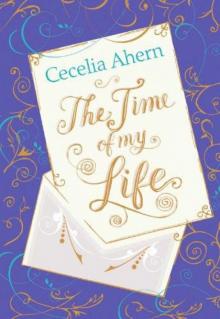 The Time of My Life
The Time of My Life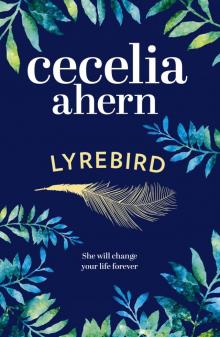 Lyrebird
Lyrebird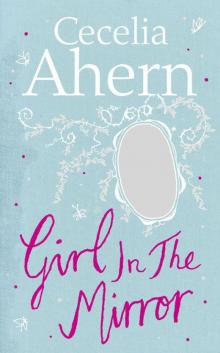 Girl in the Mirror
Girl in the Mirror Perfect
Perfect One Hundred Names
One Hundred Names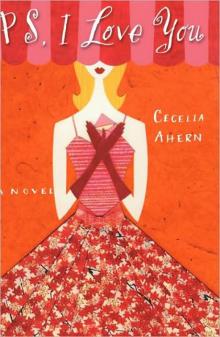 PS, I Love You
PS, I Love You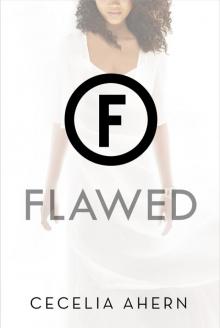 Flawed
Flawed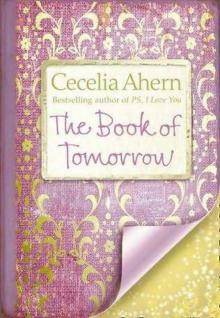 The Book of Tomorrow
The Book of Tomorrow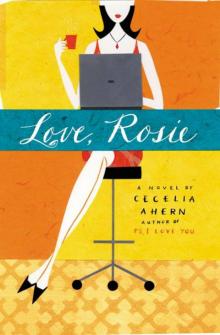 Love, Rosie
Love, Rosie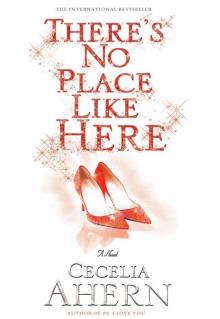 A Place Called Here
A Place Called Here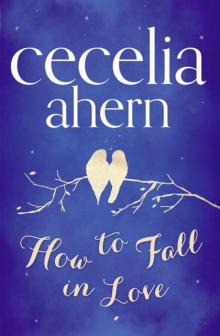 How to Fall in Love
How to Fall in Love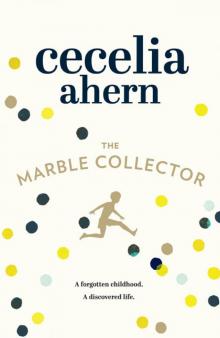 The Marble Collector
The Marble Collector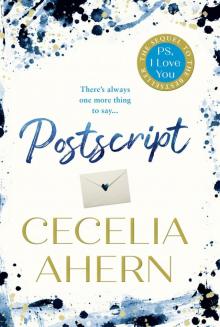 Postscript
Postscript The Gift
The Gift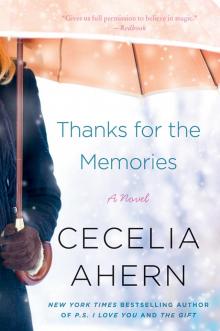 Thanks for the Memories
Thanks for the Memories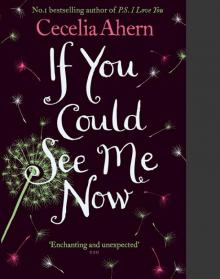 If You Could See Me Now
If You Could See Me Now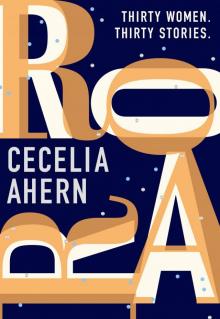 Roar
Roar Cecelia Ahern 2-book Bundle
Cecelia Ahern 2-book Bundle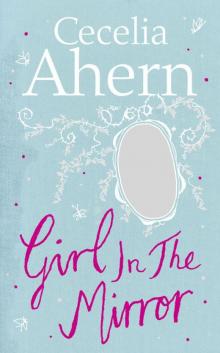 Girl in the Mirror: Two Stories
Girl in the Mirror: Two Stories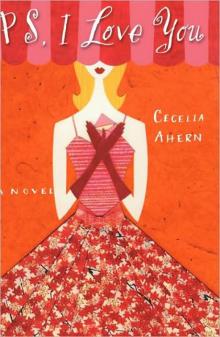 PS, I Love You: A Novel
PS, I Love You: A Novel Cecelia Ahern Short Stories
Cecelia Ahern Short Stories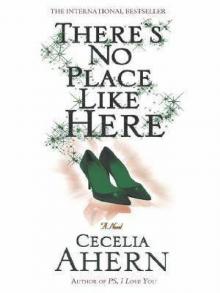 There’s No Place Like Here
There’s No Place Like Here